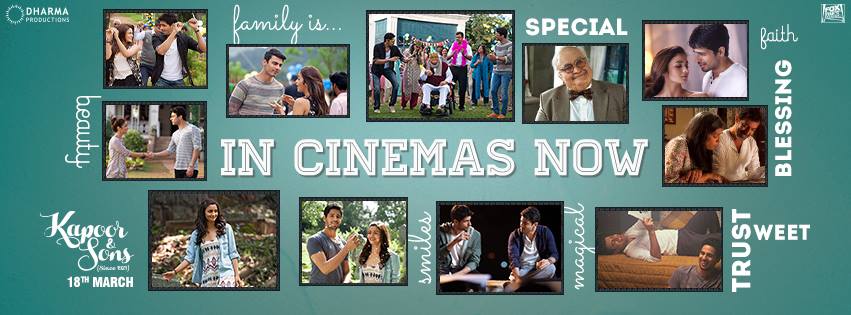
Cast: Sidharth Malhotra, Fawad Khan, Alia Bhatt, Ratna Pathak, Rajat Kapoor
Direction: Shakun Batra
Length: 2 hours 25 min
My rating: 4.5/5
I entered the theater to watch “Kapoor and Sons,” expecting to watch a typical Dharma Productions film with good songs, pretty people, and an average to below average storyline. I walked out, however, overwhelmed with emotions and a sense of pride for Bollywood for creating such a real film.
Most of Bollywood’s box office successes revolve around weak plots, misogynistic item songs, and male lead characters. While I notice the misogynist themes in the most popular movies, the Bollywood enthusiast in me can’t help but watch and enjoy (ugh. it’s my guilty confession) these movies. I accepted the reality that out of 10 films I’ll watch, maybe, just maybe, two of them will be quality, worthwhile films while the others will just be money-making entertainment.
Needless to say, I had similar expectations for Karan Johar’s newest production, “Kapoor and Sons.” Expecting it to be some kind of a bad romantic comedy featuring some sort of love triangle, “Kapoor and Sons” turned out to be the realist film about family ever made in Bollywood.
The film features Sidharth Malhotra, Fawad Khan, Ratna Pathak and Rajat Kapoor in main roles. Alia Bhatt is also in the film, but her character, Tia, isn’t a huge part of the overall story, so I wouldn’t consider her a lead in the film. While the movie doesn’t focus on the love story between Bhatt and Malhotra’s characters, it is nicely woven in throughout and doesn’t feel forced.
Malhotra plays Arjun Kapoor, younger brother of Fawad Khan’s character, Rahul Kapoor. Rahul is the perfect favorite child of the family, who is a successful author and always receiving praise from his parents. Arjun is a struggling writer who works part-time as a bartender to make end’s meet and the constant target for his parents’ lectures. While Arjun struggles with constantly being “second best” to his brother, Rahul struggles with maintaining his “perfect” label while hiding the biggest secret of his life. And while both brothers deal with their individual fights, they’re caught in between their parents’ fights and misunderstandings.
The film highlights the dysfunctions present in every family in one form or the other. It reminds us that problems in all family dynamics are normal, and abandoning family members because of it doesn’t leave anyone happy.
Besides portraying a normal, not glamorous family, director Shakun Batra doesn’t force anything into the film that isn’t necessary to tell the story. There are no spontaneous dance sequences, bad comedic timings, or unnecessary dramatic prolonged slow songs. Batra takes you on a relatable journey in which you are so emotionally invested that two hours seem to just fly by.
This is a step in the right direction that all commercial Bollywood films need to now take. Audiences are ready for refreshing scripts that they can connect with on a deeper level. “Kapoor and Sons” has paved the path for bigger budget films to create substance that isn’t just dependent on the Bollywood box office collection formula.
Hera Ashraf is a graduate with a Biology degree, hoping to pursue medicine. She is a self-proclaimed foodie with a passion for desserts. Coffee and Bollywood are her two most favorite things. She loves to read, even though she barely gets time for it anymore. Brown Girl Magazine allows her to write about the things she loves, and then shares it with the world. Her ultimate goal in life is to become a world wanderer.




